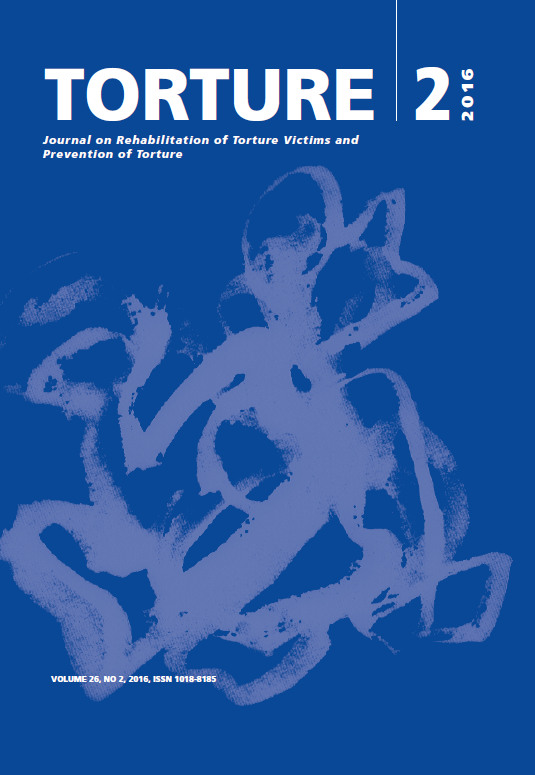Measuring change and changing measures: The development of a torture survivor specific measure of change
DOI:
https://doi.org/10.7146/torture.v26i2.108116Keywords:
outcome measures, torture, psychology, mental healthAbstract
Freedom from Torture is a UK-based human rights organisation dedicated to the treatment and rehabilitation of torture survivors. The organisation has been working towards the development of a clinical outcome tool for a number of years, and the purpose of this paper is to (a) describe the process of developing the tool and the final tool itself, and (b) to outline the system which Freedom from Torture has established to collect, record and analyse the data produced.
A review of the literature revealed that existing measures were not appropriate for measuring psychological and emotional change amongst torture survivors; therefore the organisation undertook to develop a tool specifically designed for this target group. The clinical outcome tool was developed collaboratively by Freedom from Torture clinicians, clients, interpreters and an external consultant. Initial discussions took place with clinicians and clients to develop an understanding of what psychosocial wellbeing and psychosocial distress meant to this unique population of torture survivors, and which issues and features should be included in the clinical outcome tool. A process of discussion and testing of potential approaches led to the development of a draft clinical outcome tool which was translated into 15 languages and then pilot tested with 151 clients.
The data from the pilot study was analysed and used to produce the final version of the clinical outcome tool. The clinical outcome tool was formally rolled out across the organisation’s five centres in April 2014. Clinicians working with adult clients have been completing it at the beginning of therapy and then again at regular intervals.
The data from the first year is currently being analysed, and the experiences of clinicians, clients and interpreters of using the clinical outcome tool are being reviewed, with a view to continuing to develop and improve the tool and the processes by which it is used. Ultimately, the data will be used to improve the services offered to survivors of torture in the UK.
References
2. Jaranson JM, Quiroga J. Evaluating the services of torture rehabilitation programmes: History and recommendations. Torture. 2011;21(2):98140.
3. McFarlane C.A, Kaplan I. Evidence-based psychological interventions for adult survivors of torture and trauma: A 30-year review. Transcult Psychiatry. 2012 Jul;49(3-4):539-67.
4. Patel N, Kellezi B, Williams C de C A. Psychological, social and welfare interventions for psychological health and well-being of torture survivors. Cochrane Database of Systematic Reviews 2014, Issue 11. Art. No.: CD009317. DOI: 10.1002/14651858.CD009317.pub2.
5. Montgomery E, Patel N. Torture rehabilitation: Reflections on treatment outcome studies. Torture. 2011;21(2):141-5.
6. Bolton P, Michalopoulos L, Ahmed AMA, Murray LK, Bass J. The mental health and psychosocial problems of survivors of torture and genocide in Kurdistan, Northern Iraq: A brief qualitative study. Torture. 2013;23(1):1-14.
7. Psychosocial Working Group. Psychosocial intervention in complex emergencies: A Conceptual Framework. Edinburgh: Psychosocial Working Group; 2003.
8. Inter-Agency Standing Committee (IASC), IASC Guidelines on Mental Health and Psychosocial Support in Emergencies. Geneva: IASC; 2007.
9. Sousa VD, Rojjanasrirat W. Translation, adaptation and validation of instruments or scales for use in cross-cultural health care research: a clear and user-friendly guideline. J Eval Clin Pract. 2011 Apr;17(2):268-74.
10. World Health Organisation, Process of translation and adaption of instruments [Internet] [cited Mar 26] Available from http://www.who.int/substance_abuse/research_tools/translation/en/
11. Hubbard J, Miller KE. Evaluating Ecological Mental Health Interventions in Refugee Communities. In Miller K, Rasco L editors. The Mental Health of Refugees. New Jersey: Lawrence Erlbaum; 2004. P. 337-374.
Downloads
Published
How to Cite
Issue
Section
License
We accept that some authors (e.g. government employees in some countries) are unable to transfer copyright. The Creative Commons Licence Attribution-NonCommercial-NoDerivatives 4.0 International (CC BY-NC-ND 4.0) covers both the Torture Journal and the IRCT web site. The publisher will not put any limitation on the personal freedom of the author to use material contained in the paper in other works which may be published, provided that acknowledgement is made to the original place of publication.


